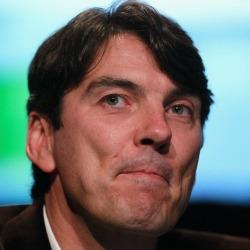BROOKE GLADSTONE: And I'm Brooke Gladstone. For the first time ever, I punched my zip code into AOL's Patch.com, a network of hyper-local websites serve mostly upscale communities. I found that a burglar was caught in flagrante delicto a few blocks north of me and that MTV, which will be holding its award show at a nearby arena, won't share its crowd control plans with frustrated locals, and that the carousel in the park is offering free this weekend.
Patch, acquired by AOL in June of 2009, now operates about 900 sites but the company just announced it's cutting nearly half of them and hundreds of staff. Why do we care? Because of all the plagues on modern journalism, the one that seems to cause the greatest angst in official circles is the squeeze on local reporting. How do we learn about the stuff that affects us day to day?
The Wall Street Journal's Keach Hagey said that AOL CEO Tim Armstrong was sure that Patch would both turn around AOL's fortunes and fill that local news gap.
KEACH HAGEY: Patch was tied to Tim Armstrong more tightly than any other thing, even more than the Huffington Post acquisition that he did after coming to AOL. He cofounded it and, under some duress last year in the middle of a, a proxy battle with an angry investor, he promised to make it profitable by the end of this year, kind of come hell or high water and seen over the last year that he’s had to make a lot of tough decisions.
BROOKE GLADSTONE: Those tough decisions seem to be playing on him a bit. There’s that now famous clip of him actually firing someone during a, a conference call with what, a thousand employees?
KEACH HAGEY: Right, that audio has gone viral.
[CLIP]:
TIM ARMSTRONG: Abel, put that camera down right now! Abel, you're fired. Out!
[END CLIP]
KEACH HAGEY: It was in the middle of a speech about how he wouldn't care about them leaking to the press about Patch that he got rid of someone who was documenting [LAUGHS] his getting rid of a bunch of people at Patch.
BROOKE GLADSTONE: How much money was AOL actually pouring into Patch each year?
KEACH HAGEY: Well, that number had been going down over time, but back in 2011 it was $160 million a year.
BROOKE GLADSTONE: What was AOL getting for its money?
KEACH HAGEY: It was getting local advertising, regional advertising and some national advertising. It just wasn’t getting any of that fast enough to offset the cost. According to comScore, which doesn’t count mobile, Patch drew 11 million unique visitors in July, which was the same number that it drew July of last year. They had started cutting costs, you know, last year, and they admitted that that cost cutting was going to have an effect on the traffic growth.
BROOKE GLADSTONE: Some people have criticized this really severe cutting on the grounds that if you try to push this accelerated deadline on profitability with these hyper local sites they never can work, but if given the proper time maybe they could.
KEACH HAGEY: And for that reason, a lot of people say a public company, like AOL, is not the right place to do something like this. You need to do it with the flexibility that only a private company can bring. Local news is really labor intensive and the audience that you can pull together for that is, is never really gonna be big enough, at least right now, to support advertising in the way that the current online advertising ecosystem works.
BROOKE GLADSTONE: Never, ever, ever?
KEACH HAGEY: People are experimenting with new models all the time, but online advertising just doesn't pay very much.
BROOKE GLADSTONE: Do you have an inkling of any kind of business model that might work?
KEACH HAGEY: Well, I do think that paywalls for local newspaper provide one tiny glimmer of light in an otherwise [LAUGHS] very dark outlook for local news. For example, Gannett, they’ve been charging paywalls on their local papers. These are not necessarily big cities. And it seems to be working, maybe not quite as well as they’d originally hoped but still a lot better than whatever they were doing before. So there is evidence that people will pay for news about their local community.
BROOKE GLADSTONE: Just not enough for AOL's board of directors.
KEACH HAGEY: Right!
BROOKE GLADSTONE: Thank you very much, Keach.
KEACH HAGEY: Thank you.
BROOKE GLADSTONE: Keach Hagey is a media reporter for the Wall Street Journal.
